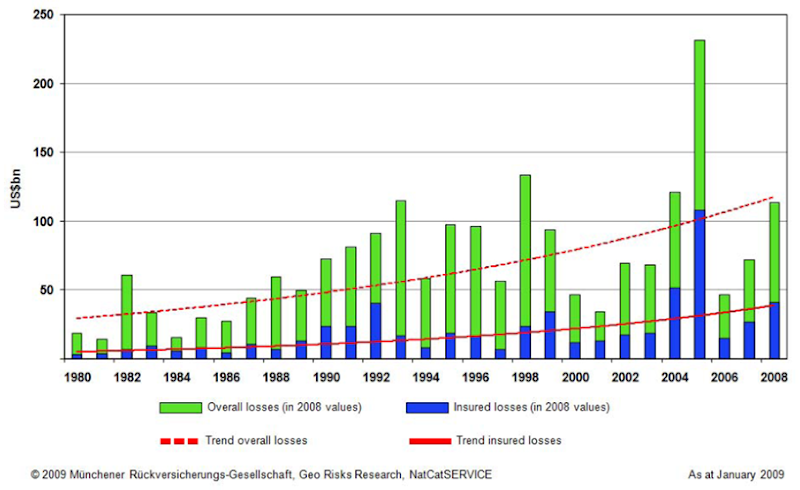Graph of the Day: Economic and Market Losses Caused by Weather Events, 1980–2008
Climate change is one of the biggest challenges facing mankind. It claims many lives. And it also costs a great deal, given the rising trend in weather-related natural catastrophes and resulting losses. Whilst a number of factors are involved, there is clear evidence indicating that one cause is climate change. Climate protection is necessary and makes economic sense. It is therefore very important for the Copenhagen climate summit (7–18 December 2009) to achieve significant progress and, as far as possible, lay the cornerstones of a strict climate agreement. “Our statistics clearly show that the loss burden from weather-related natural catastrophes is increasing. A year like 2009, with relatively low losses to date, in no way contradicts this”, said Torsten Jeworrek, member of Munich Re’s Board of Management responsible for reinsurance business. “Something must be done. Even if an all-embracing agreement does not seem feasible in Copenhagen, at the very least fundamental framework conditions should be established. We cannot afford a delay at the expense of future generations.” Munich Re’s NatCatSERVICE database shows that, globally, the average number of major weather-related catastrophes such as windstorms, floods or droughts is now three times as high as at the beginning of the 1980s. Losses have risen even more, with average increases of 11% per year since 1980. To what extent the increased losses are due to climate change is not yet clear. Preliminary analyses suggest that it accounts for a low single-digit percentage of annual overall losses. Although this increase appears low, the amounts involved are enormous. This is illustrated by total natural catastrophes losses in the period 1980–2008. According to studies by Munich Re, overall losses due to weather-related events came to around US$ 1.6tn in original values, with insured losses amounting to approximately US$ 465bn. In the period from 2000–2008 alone, overall losses totalled over US$ 750bn, whilst insured losses came to around US$ 280bn. “Even conservative estimates show that we are talking here about climate change costs already running into billions per year. The insurance industry is able to adapt but, in the end, each individual has to bear the cost”, said Peter Höppe, Head of Munich Re’s Geo Risks Research. “It is therefore very important and makes economic sense to lay cornerstones for a new agreement, with ambitious targets, in Copenhagen. After all, the climate reacts slowly. Even now, climate change can no longer be halted, it can only be attenuated. And it is high time this was done.” …
Ambitious climate protection targets are needed – or the cost of climate change will keep rising [pdf]
